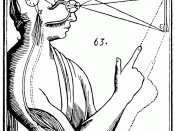With his "Meditations on First Philosophy" Rene Descartes has essentially written the method for skepticism. With his system of universal doubt Descartes dismissed all of his beliefs and accepted only those beliefs, which could be indisputably proven. Descartes was a mathematician, philosopher and skeptic and I as a novice mathematician, philosopher and skeptic appreciate his work and I believe there is much worth in his method of doubt. However, beyond his method of doubt I believe his logic is imprecise and his arguments are unsound. Skipping to the article at hand, in Descartes sixth meditation he establishes himself as a mind/body dualist, which means he believes the mind and body to be two distinct and different substances. His argument for this includes highly insufficient data and his hypothesis for how the mind and body interact, if they are two distinct substances, is wishful thinking at best.
In his sixth meditation, Rene Descartes gives reasoning for why he believes the mind and body to be two distinct substances.
The argument is as follows:
(1) When I think of my mind, I can't distinguish parts of it.
(2) I can distinguish parts of something if and only if it is divisible.
(3) Therefore, the mind is indivisible.
(4) When I think of my body, I can distinguish parts.
(5) Therefore, the body is divisible.
(6) Nothing is both divisible and indivisible.
(7) Therefore, he mind is not the same thing as the body.
This conclusion of mind/body dualism creates the problem of how the mind and body interact if they are different substances. Descartes answers this by hypothesizing that the pineal gland facilitates their interactions. He points to this gland because it has a central location in the brain and he believes it to be the only part of the...


